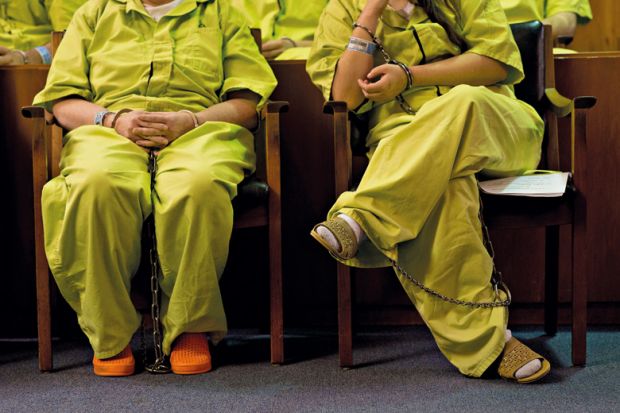Convicted of committing fraud and forgery to bankroll an alcohol habit, Amy Stone emerged from prison in 2006 as a single mother of a son born behind bars, and with a criminal record and few prospects.
After managing to kick her drinking habit, Ms Stone slowly worked towards an associate’s degree and, finally, a bachelor’s degree in social work, which she received in May. Her next destination? A graduate programme at private Fordham University in New York, the next step on the path towards becoming a substance-abuse counsellor and helping others like her.
But one question on the application form stopped her short. It asked whether she had ever been found guilty of a crime.
“Not only do you have to check the box, but you have to explain all those details,” Ms Stone said.
“It can be very discouraging [and] it can take a toll on your self-esteem. My last conviction was in 2004, and I still have to explain, 12 years later. You have this sense of, I did my time and I’m still being judged.”
Ms Stone continued with her application and was accepted [on to the course], but many people in similar circumstances never complete the process.
While two-thirds of US universities ask applicants whether they have a criminal record, according to an advocacy group called the Center for Community Alternatives, a study by the same organisation found that 63 per cent of people with a criminal history begin but never finish the process – three times the proportion of other applicants.
“Education is one of the key factors [in] rehabilitation,” Ms Stone said. But that single box “prevents a lot of people from going forward with it”.
Now, pushed by the Obama administration, and responding to evidence that the American criminal justice system disproportionately targets non-whites, some US universities are eliminating the question.
Eighty-six US universities, including the campuses of one of the nation’s largest university systems, the State University of New York, or SUNY, have pledged to no longer ask applicants about their criminal histories, or at least to consider eliminating the question. And there’s legislation, also in New York, that would ban all higher education institutions there from raising it during the admissions process.
“We’re really framing this as a human rights issue and a civil rights issue,” said Emily NaPier, a sociologist and leader of a coalition of prison education advocates called Education from the Inside Out, who is also director of justice strategies for the Center for Community Alternatives.
“We have erected barriers at every turn for people with even very minor criminal records. It’s stigmatising and sometimes traumatising to have to relive past mistakes, often minor mistakes, over and over again for the rest of your life.”
There remains some resistance to the idea of eliminating the criminal-history question altogether, especially at a time when universities are also being held to account for security problems on their campuses and issues such as sexual assaults.
Even SUNY will continue to ask about prior serious convictions when students apply for housing, clinical assignments, internships, or to study abroad. And the Common Application, used by more than 600 universities, still asks applicants to disclose both minor and serious offences.
There’s little evidence that ex-convicts who go to university commit new crimes there, however. One study has found that colleges that restricted access for students with criminal histories do not have significantly lower crime rates; another concluded that only a small number of students who reported having criminal records engaged in misconduct once enrolled.
The federal government is also making available financial aid on an experimental basis to pay for post-secondary education and training for as many as 12,000 people while they are still in prison.
“When people make mistakes, we have to focus on how we give them a meaningful second chance,” said John B. King Jr, US secretary of education.
The US has, by far, the highest rate of incarceration in the developed world, with nearly 2.3 million people detained. That is 25 per cent of the inmates on earth, in a country with 5 per cent of its population. Some 70 million Americans, or one in three working-age adults, have criminal records.
A government-funded study found that imprisoned people who take part in educational programmes are 43 per cent less likely to be convicted of another crime within three years compared with those who do not.
“People with criminal history records are among us all the time,” said Dr NaPier. “We encounter them every day. It’s really a question of, do you want that person to be closed out of opportunities and more likely to resort again to crime, or would you rather have a person who is able to contribute to their community?”
As for Ms Stone, who is working while raising her now 11-year-old son, she has two years to go before she receives her master’s degree. She’s also mentoring another woman recently released from prison, who is planning to start university in January.
“I have this second chance at being a mom and being a person that I’m meant to be,” Ms Stone said. But others, she said, “are [still] falling between the cracks”.
POSTSCRIPT:
Print headline: ‘You have this sense of, I did my time and I’m still being judged’
Register to continue
Why register?
- Registration is free and only takes a moment
- Once registered, you can read 3 articles a month
- Sign up for our newsletter
Subscribe
Or subscribe for unlimited access to:
- Unlimited access to news, views, insights & reviews
- Digital editions
- Digital access to THE’s university and college rankings analysis
Already registered or a current subscriber? Login







